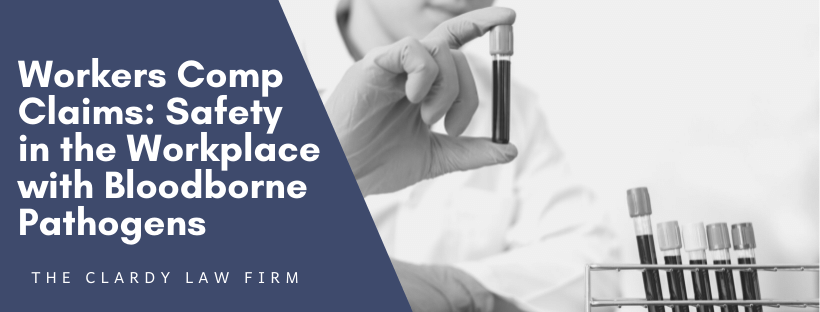Bloodborne pathogens are not a common reference heard during the work day, but they are a safety concern for individuals that have jobs within a school, city, or public organization. Bloodborne pathogens are found in the human blood and can cause diseases or infections when spread from person to person. The Clardy Law Firm understands that it is important for employers and their employees to be aware of how to work safely in an environment where contact with bloodborne pathogens may occur. Exposure to bloodborne pathogens can cause employees to miss days on the job, and make for an unsafe atmosphere within the workplace.
Types of Bloodborne Pathogens
“Bloodborne pathogens are infectious microorganisms in human blood that can cause disease in humans. These pathogens include, but are not limited to, hepatitis B (HBV), hepatitis C (HCV) and human immunodeficiency virus (HIV),” according to the Occupational Safety and Health Administration (OSHA).
Workers can be exposed to them by a pointy needle sticks and injuries from knives or other sharp objects. Food service employees are at risk because they may work with knives and kitchen utensils that could cut or scratch them. Janitorial and maintenance staff often work with tools, metals, and wood products that can have sharp edges, and may cause harm if a person is not being extremely careful. School nurses and emergency medical professionals work with syringes and come into contact with blood due to the nature of their jobs.
Exposure to Bloodborne Pathogens
Teachers, school nurses, clean-up crews, fire department personnel, first responders, emergency medical technicians, food service staff, and many others can come into contact with bloodborne pathogens on a daily basis due to their job descriptions.
According to the Centers for Disease Control and Prevention, “Health care workers, emergency response and public safety personnel, and other workers can be exposed to blood through needlestick and other sharps injuries, mucous membrane, and skin exposures.”
Gloves, aprons, and clearly marked garbage pails for this type of waste should be on-site, and employees should be trained to look for them and use them when necessary.
If you are an employee and have been made sick by a bloodborne pathogen that was contracted while working, please contact The Clardy Law Firm for assistance in filing a workers compensation claim.





